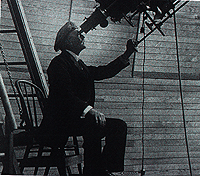New Realities and Preposterous Dreams ...........Two landmark science fiction volumes by the influential author Jules Verne, as well as several revolutionary discoveries in the sciences motivated a heightening awareness and interest in the moon and planets as potential areas of exploration during the nineteenth and early twentieth century. In the prophetic visions of the French author Jules Verne, laid down first in a book titled From the Earth to the Moon and then in its sequel ‘Round the Moon, a post-civil war American society went "moon mad" and quested to claim all territory on "The Queen of the Night". In the first volume, Verne called the American Yankees "the first mechanicians in the world", imagining an impossible scenario where a giant cannon was dug deep into Tampa, Florida, from which a manned bullet would be fired straight to the moon (Sullivan, 6). This captivating and fantastic tale enjoyed huge success with a spellbound audience, inspiring later some of the most influential rocket men to pursue with practical science such an absurdly radical goal. Along with this gem of science fiction lore came other serious rallying points for space exploration. |
|
